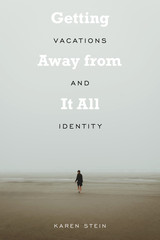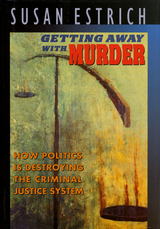
Vacations are a delimited period during which social rules and responsibilities are eased, removed, or shifted, and people have increased autonomy over what they choose to do. Recent trends in the travel industry emphasize the appeal of vacations for voluntary identity changes—when bankers can become bikers for a week or when “Momcations” allow mothers to leave their families behind. But how do our vacations allow us to shape our identity?
Getting Away from It All is a study of individuality and flexibility and the intersection of self-definition and social constraint. Karen Stein interviews vacationers about their travels and down time, focusing on “identity transitions.” She shows how objects, settings, temporal environments and social interactions limit or facilitate identity shifts, and how we arrange our vacations to achieve the shifts we desire. Stein also looks at the behavior, values, attitudes, and worldview of individuals to illuminate how people engage in either identity work or identity play.
Vacations say a lot about individuals. They signal class and economic standing and reveal aspirations and goals. Getting Away from It All insists that vacations are about more than just taking time off to relax and rejuvenate—they are about having some time to work on the person one wants to be.

Justice isn't blind. It's winking. This is the message Americans get when, against the weight of overwhelming evidence, high-profile suspects go free; when there are special sentencing rules for battered wives or adult survivors of childhood abuse; when murderers are released from prison to rape and murder again, and politicians make political hay out of these cases; when lawyers look less like servants of higher values and more like profit seekers reaping fortunes by helping clients get away with murder. This book is a penetrating look into what's wrong with the American legal system, a devastating critique of how politics has corrupted criminal law in America.
Written with clarity and simplicity, Getting Away with Murder is a lesson in how the law works and a blueprint for how it should work. Susan Estrich takes on the enflamed issues, from the O. J. Simpson trial to three strikes legislation, but pushes well beyond the soundbite answers. Drawing on her background as a lawyer, political commentator, professor, and national campaign manager for Michael Dukakis, she brings academic expertise and political experience together in a way that very few people can.
In particular, Estrich argues that group-based jury nullification, like group-based abuse excuses, is precisely the wrong answer to the biases of the criminal justice system. Getting Away with Murder also views this system in the wider political arena, where fiascoes like the Willie Horton case stifle political debate and promote policies that tie the hands of judges in dealing with dangerous offenders. Lawyers do not escape Estrich's notice; she directs some of her most pointed remarks at the failure of the legal profession to tend to the ethical duties and legal values that it professes.
At a time when three quarters of black Americans believe that the criminal justice system is racist and unfair; when nearly half of all whites think it's ineffective and in decline; when crime, though falling, still tops the list of public concerns, and politicians exploit public distrust of the system to get elected, Getting Away with Murder makes a statement that is powerful, controversial, and urgently needed.
READERS
Browse our collection.
PUBLISHERS
See BiblioVault's publisher services.
STUDENT SERVICES
Files for college accessibility offices.
UChicago Accessibility Resources
home | accessibility | search | about | contact us
BiblioVault ® 2001 - 2024
The University of Chicago Press









